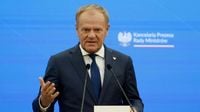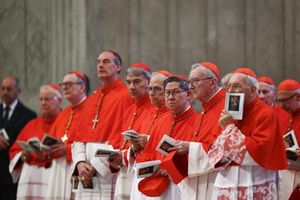On May 7, 2025, newly elected Chancellor Friedrich Merz (CDU) embarked on a significant diplomatic journey, aiming to revitalize Germany's foreign relations, particularly with France and Poland. His inaugural visit to Paris was met with warmth from President Emmanuel Macron, who expressed enthusiasm for a "restart" in German-French relations, a sentiment echoed by Merz as he seeks to enhance Germany's role on the international stage.
Macron greeted Merz with a warm embrace at the Élysée Palace, stating, "I am pleased that you honor me by beginning your mandate here in Paris." This meeting signifies not just a ceremonial welcome but a critical moment for both nations as they navigate the shifting dynamics of European politics.
Merz's diplomatic agenda is ambitious, focusing on mending ties with France and Poland, which have been strained in recent years. He aims to revive the Weimar Triangle—a partnership between Germany, France, and Poland—that has lost prominence under previous administrations. In his discussions with Macron, Merz emphasized the need for closer cooperation in defense, particularly in light of increasing global tensions and the ongoing war in Ukraine.
Henning Hoff from the German Council on Foreign Relations commented on Merz's approach, stating, "It’s crucial for him to find the right tone on the international stage and signal that Germany wants to play a more active and larger role." This sentiment reflects the urgency felt among European allies for a cohesive response to international challenges.
Merz's visit to Warsaw later that day further underscored his commitment to strengthening relations with Poland, especially following years of tension marked by the previous Polish government's demands for reparations from Germany. Polish Prime Minister Donald Tusk welcomed Merz's arrival, indicating a desire for a "new rapprochement" in bilateral relations.
During their meeting, Merz addressed the contentious issue of World War II reparations, stating that while the matter is legally closed, he is open to discussions on collaborative projects that could foster goodwill. Tusk, however, criticized Germany's plans for stricter border controls against irregular migration, asserting, "Poland will only let in those it accepts." This statement highlights the delicate balance both countries must maintain as they navigate migration issues.
Merz defended Germany's new migration policy, which includes stricter border controls and increased rejections at the borders, stating that these measures are necessary given the high levels of irregular migration in the EU. He remarked, "The controls at the internal borders may only be a transition, but they are necessary as long as we have such high irregular migration in the European Union." This policy has sparked debate, with concerns that it could further strain relations with Poland.
The geopolitical landscape is further complicated by the looming threat of import tariffs from the United States under President Donald Trump, which Merz views as a significant challenge for Germany's export-driven economy. He has expressed a desire for a free trade agreement with the U.S. while simultaneously aiming to de-escalate trade tensions.
In a recent interview during his flight from Paris to Warsaw, Merz outlined his foreign policy priorities, emphasizing the importance of achieving European independence from U.S. influence. He stated, "Europeans must achieve true independence from the USA," reflecting a growing sentiment among European leaders regarding the need for a unified stance in global affairs.
As part of this strategy, Merz plans to engage in direct discussions with Trump, with a phone call scheduled for May 8, 2025. He has made it clear that while he welcomes dialogue, he will not tolerate interference in Germany's domestic policies.
In addition to addressing transatlantic relations, Merz is also focused on the EU's internal challenges, particularly concerning migration and security. The new German government plans to bolster its defense capabilities and enhance cooperation with France and other EU states to ensure a united front against external threats.
The recent political shifts within the EU, including the rise of right-wing populism in various member states, pose additional challenges for Merz's administration. Leaders like Hungary's Viktor Orban and Italy's Giorgia Meloni have maintained close ties with Trump, complicating the EU's collective response to issues such as the war in Ukraine and relations with Russia.
As Merz navigates these complex international waters, he faces domestic challenges as well. His approval ratings are lukewarm, with only 32% of respondents in a recent ARD-DeutschlandTrend survey viewing him favorably. This lack of robust support could hinder his ability to implement significant policy changes.
Moreover, the new government is grappling with internal cohesion, as highlighted by the recent difficulties in the Bundestag during Merz's election. The coalition's stability is critical, especially as they approach sensitive discussions about migration and defense policy.
On the eve of the 80th anniversary of the end of World War II, Merz's administration is also preparing for commemorative events, reflecting on Germany's historical responsibilities while striving to forge a new path in international relations.
In conclusion, Friedrich Merz's initial days as Chancellor are marked by a proactive approach to foreign policy, with a clear intent to restore Germany's standing in Europe and beyond. His ability to balance domestic expectations with international obligations will be crucial as he seeks to navigate the challenges ahead.





